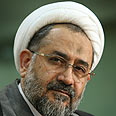


The United States on Thursday announced sanctions on Iran's Ministry of Intelligence and Security (MOIS), which it accused of supporting terrorism, abusing the human rights of Iranian citizens and supporting the Syrian government's crackdown.
"Today we have designated the MOIS for abusing the basic rights of Iranian citizens and exporting its vicious practices to support the Syrian regime's abhorrent crackdown on its own population," David Cohen, the US Treasury's under secretary for terrorism and financial intelligence, said in a statement.
Related articles:
- New bill to press Obama on Iran strike?
Netanyahu: Iran sanctions not working
Op-ed: Don’t waste money on Iran
MOIS also provides support for al-Qaeda, al-Qaeda in Iraq, Hezbollah and Hamas, "exposing the extent of Iran's sponsorship of terrorism as a matter of Iranian state policy," Cohen said.
The move is the latest in a series of steps the United States has taken to increase pressure on Iran over its nuclear program, which Tehran says is for peaceful purposes.
It bars MOIS officials from travelling to the United States, blocks any property MOIS owns in the US and prevents US citizens or companies from dealings with MOIS.
Letter asks for renewed talks
Meanwhile, CNN reported that Iranian President Mahmoud Ahmadinejad has offered to resume talks over his country's nuclear program, according to a letter he sent to the European Union.
CNN said it had obtained a copy of the letter as Iran announced new steps in its nuclear program.
Earlier Thursday, US intelligence officials said that if Iran is attacked over its alleged nuclear weapons program, it could retaliate by closing the Gulf's Strait of Hormuz to ships and launch missiles at regional US forces and allies.
Testifying before the Senate Armed Services Committee, Defense Intelligence Agency chief Lt. Gen. Ronald Burgess said Iran is unlikely to initiate or intentionally provoke a conflict.
Burgess and Director of National Intelligence James Clapper said they do not believe that Israel has decided to strike Iran.
'Iran hasn't decided on atom weapon'
On the other side of the Capitol, Defense Secretary Leon Panetta said intelligence shows that Iran is continuing to enrich uranium but that Tehran has not made a decision to proceed with developing a nuclear weapon. The former CIA director said the United States is open to negotiations with Iran to find a diplomatic solution, but he said the US keeps all options on the table to ensure that Tehran does not acquire a nuclear weapon.
Clapper said it's "technically feasible" that Tehran could produce a nuclear weapon in one or two years, if its leaders decide to build one, "but practically not likely."
On Wednesday, the Obama administration said it began efforts to press the European Union and a global electronic banking system to expel Iranian banks from the network, another step in Western efforts to deprive Tehran of funds needed to develop nuclear weapons.
Kicking Iranian banks out of the Belgium-based SWIFT or Society for Worldwide Interbank Financial Telecommunication, would cut off one of the only remaining avenues for Iran to do business with the rest of the world.
Yizthak Benhorin contributed to the report
- Receive Ynetnews updates
directly to your desktop















